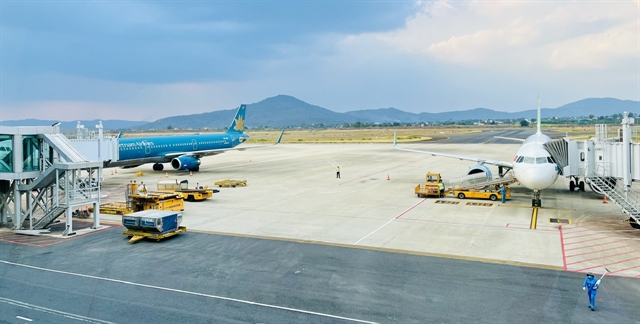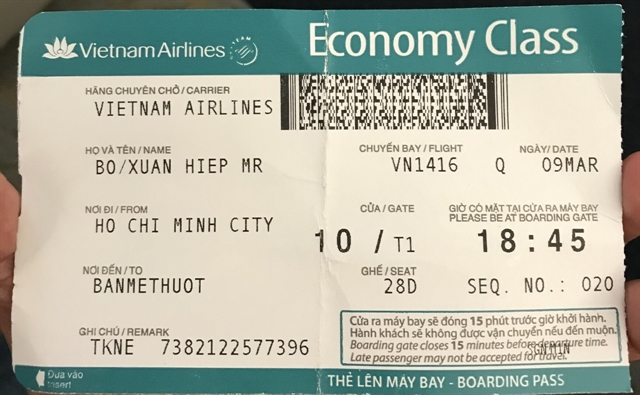 Society
Society

 |
| Aircraft parked at Liên Khương Airport in the Central Highlands province of Lâm Đồng. — VNS Photo Bồ Xuân Hiệp |
HCM CITY — The Civil Aviation Authority of Vietnam (CAAV) has acknowledged the recent hike in domestic airfares, but has assured the public the surge is ‘within the limits set by authorities’.
In a report sent to the Ministry of Transport, the agency stated average economy class ticket prices on several domestic routes have surged by up to 25 per cent year-on-year in the first four months.
On the popular Hà Nội – HCM City route (1,278 km), Vietnam Airlines’ average ticket price is around VNĐ2.64 million (up 14 per cent from last year), Vietjet VNĐ1.74 million (up 25 per cent), Bamboo Airways VNĐ2 million (up 11 per cent), and Vietravel Airlines VNĐ1.5 million (up 15 per cent).
“These prices are still below the regulated ceiling prices,” it noted.
Similarly, on routes between Hà Nội and HCM City to/from Đà Nẵng (around 600km), the average ticket prices of different airlines have also increased but remain below the regulated ceiling price.
The transport ministry recently announced an increase in the maximum prices for domestic flight routes starting from March 1.
The price hikes vary depending on the distance of the route, with prices being raised by VNĐ50,000-250,000 per one-way ticket for flights longer than 500km.
For example, flights between 1,000km to less than 1,280km now have a maximum price of VNĐ3.4 million for one-way tickets, while flights longer than 1,280km have a maximum price of VNĐ4 million for one-way tickets.
These maximum prices cover all expenses related to airline services, but do not include value-added tax and airport fees such as passenger service fees, security assurance fees, baggage charges, and fees for additional services.
 |
| A boarding pass issued by national flag carrier Vietnam Airlines. — VNS Photo Bồ Xuân Hiệp |
Global trend
The CAAV has attributed the hike in domestic airfares to global trends such as rising fuel prices, exchange rate differences, aircraft lease costs, and increased demand.
Significant changes in the aviation industry this year, including airlines restructuring operations and reducing their fleets, have also contributed to the price hikes.
Bamboo Airways, for instance, has reduced its fleet from 28 aircraft to only a few after returning all Embraer E190 aircraft to the leasing company.
Pacific Airlines has also ceased operations and returned all aircraft to address debts.
A recall of Pratt & Whitney (PW) PW1100G engines earlier this year has also led to inspections and repairs of manufacturing defects, potentially impacting airline operations.
Local airlines such as Vietnam Airlines and Vietjet Air, among others, are expected to adjust their fleets or incur huge costs to lease aircraft to maintain operations.
The agency has also predicted high air travel demand will continue during the upcoming peak summer season, which will potentially lead to further increases in domestic airfares.
It has established a task force to investigate the airfare surge as ordered by the transport ministry.
The inspection team will thoroughly review the pricing, transparency, and disclosure of information related to airfares since the beginning of the year, and report its findings to the finance ministry by the end of this week.
The public has recently expressed worries over the price hikes, citing taxes and fees as a contributing factor.
The Tax Management and Policy Supervision Department under the finance ministry has, however, clarified the surge in airfares is not due to taxes or fees.
Reports have shown domestic flight prices during recent five-day holiday have been 1.5 times higher than usual since March.
For instance, a round-trip ticket from Hà Nội to Quy Nhơn (which takes one and a half hours) between April 27 and April 30 cost over VNĐ5 million ($200).
The price is VNĐ600,000 higher than that at the peak period a month prior, and VNĐ2 million higher than the following week. — VNS